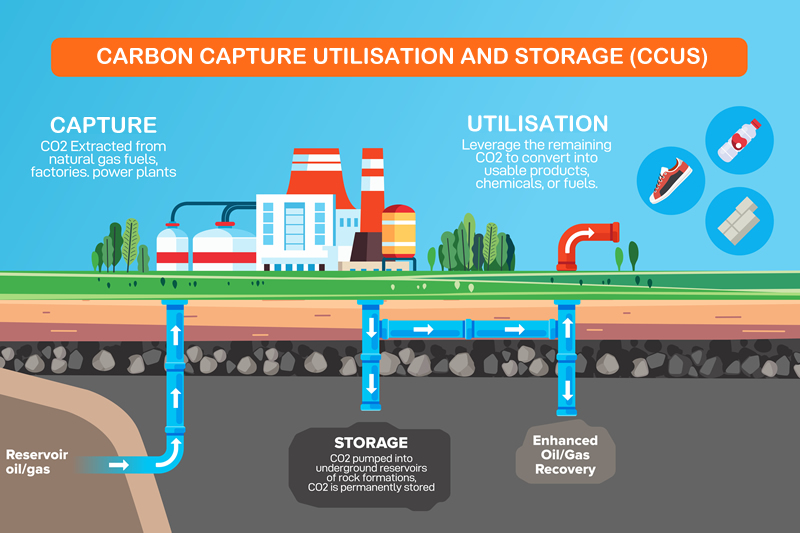Carbon Capture Utilisation & Storage In A Nutshell
30
CCUS is a climate technology that captures carbon dioxide (CO2) emissions from industrial processes and power generation, then either uses it in other applications or stores it permanently underground to prevent it from entering the atmosphere

What is CCUS and Why Does it Matter?
Carbon Capture, Utilisation, and Storage (CCUS) is a vital technology for reducing emissions from heavy industry and supporting low-carbon power generation. It captures carbon dioxide (CO2) emissions at their source, compresses them, and transports the CO2 by pipeline or ship for either reuse or safe, long-term storage deep underground. CCUS is essential for cutting emissions from heavy industries. It also supports low-carbon power from gas and enables hydrogen energy especially important when renewable sources like wind or solar aren't available.
How Does CCUS Work?
CCUS captures CO2 from industrial facilities or power plants and prevents it from entering the atmosphere. The CO2 is stored in porous rock formations, such as depleted oil and gas fields or deep saline aquifers, beneath layers of impermeable rock (called caprock), which trap the gas securely. Storage sites are continuously monitored to ensure safety and permanence.
Is CCUS Proven and Safe?
Yes, CCUS has been safely in operation since 1996 at Norway's Sleipner site in the North Sea. This experience paved the way for larger projects like Northern Lights, which now offers commercial CO2 storage for European industries. All components of the CCUS chain have been used globally for decades. In the UK, existing Health and Safety regulations, combined with offshore industry expertise, make CCUS a safe and manageable solution.
Can CCUS Help Fight Climate Change?
CCUS is the lowest-cost route to net zero. It's not just an option, it's a necessity. It allows us to cut emissions from sectors that can't otherwise be decarbonised and plays a critical role in reaching our climate goals.
Why Do We Still Need CCUS if Renewables Are Growing?
To keep the lights on in all conditions, we need low-carbon power that works 24/7. CCUS-equipped gas power stations provide this reliability. Beyond electricity, CCUS is also key to decarbonising industries like cement and steel, which have few other viable options.
What About the Cost of CCUS?
Costs vary depending on where CO2 is captured, how it's transported, and where it's stored. But compared to other decarbonisation options, CCUS is often the most practical, or the only, solution currently available.
Is There Enough Space to Store Captured Carbon?
The UK's North Sea could store up to 78 gigatonnes of CO2, enough to hold centuries of emissions. We believe the UK has a strong case to become a global carbon storage hub. CCUS is a safe, proven, and essential technology for cutting emissions in hard-to-abate sectors, ensuring reliable low-carbon power, and helping the world reach net-zero targets, at a cost that is often competitive and with ample storage capacity available.
#Protea #Emissions #Monitoring #CEMS #FTIR #Gas #Analysers #Shipping #Marine #Carbon #Capture
Other Articles
The EU Emissions Trading System ETS In A Nutshell
02
Rising Carbon Costs Drive The Need For Accurate Emissions Management In European Shipping
26
Carbon Capture Utilisation & Storage (CCUS) In 2026
16
Global Underground CO2 Storage Data Offers Hope Amid Rising Emissions
01
IMO Postpones Adoption Of Global Net-Zero Shipping Framework
04
Pioneering Carbon Capture Projects Ready For Construction
03
Methanol & Ammonia Deemed Ready As Zero-Emission Shipping Fuels
01
Carbon Capture Storage Reaching A Turning Point In Decarbonisation
13
CCS To Capture 15% Of Shipboard Carbon Emissions By 2050
29
Global Shipping Industry Struggles To Navigate Net Zero Transition
21